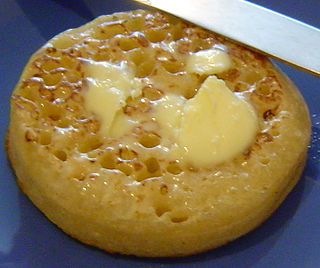 | |
| Type | Pancake |
|---|---|
| Place of origin | France |
| Region or state | Auvergne |
| Main ingredients | Egg, wheat flour, fruits |
A pachade, also known as a farinette, is a thick and crispy pancake which is traditionally eaten in the French region of Auvergne. [1]
 | |
| Type | Pancake |
|---|---|
| Place of origin | France |
| Region or state | Auvergne |
| Main ingredients | Egg, wheat flour, fruits |
A pachade, also known as a farinette, is a thick and crispy pancake which is traditionally eaten in the French region of Auvergne. [1]
Pachade is prepared like a pancake. The recipe includes eggs, several tablespoons of wheat flour, salt and milk, mixed into a paste thicker than a typical pancake batter. [2] Pachade may be sweet or savoury. [3] [4]

A pancake is a flat cake, often thin and round, prepared from a starch-based batter that may contain eggs, milk and butter and cooked on a hot surface such as a griddle or frying pan, often frying with oil or butter. Archaeological evidence suggests that pancakes were probably the earliest and most widespread cereal food eaten in prehistoric societies.

Potato pancakes, raggmunk, draniki, deruny, latkes or boxties are shallow-fried pancakes of grated or ground potato, matzo meal or flour and a binding ingredient such as egg or applesauce, often flavored with grated garlic or onion and seasoning. They may be topped with a variety of condiments, ranging from the savory, to the sweet, or they may be served plain. The dish is sometimes made from mashed potatoes to make pancake-shaped croquettes. Some variations may be made with sweet potatoes.

A dosa is a thin pancake or crepe, originating from South India, made from a fermented batter predominantly consisting of lentils and rice. It is somewhat similar to a crepe in appearance, although savoury flavours are generally emphasized. Its main ingredients are rice and black gram, ground together in a fine, smooth batter with a dash of salt, then fermented. Dosas are a common dish in South Indian cuisine, but now have become popular all over the Indian subcontinent. Dosas are served hot along with chutney by tradition and sambar in recent times. Other accompaniments include chutney powder.

Christopher Richard "Rick" Stein, is an English celebrity chef, restaurateur and television presenter. Along with business partner Jill Stein, he has run the Stein hotel and restaurant business in the UK. The business has a number of renowned restaurants, shops and hotels in Padstow along with other restaurants in Marlborough, Winchester and Barnes. He is also the head chef and a co-owner of "Rick Stein at Bannisters" at Mollymook and Port Stephens in Australia, with his second wife, Sarah. He has written cookery books and presented television programmes.

A crumpet is a small griddle cake made from an unsweetened batter of water or milk, flour, and yeast, eaten in the United Kingdom, Canada, New Zealand, and Australia.

Farinata, socca, torta di ceci, or cecina is a type of thin, unleavened pancake or crêpe made from chickpea flour. It originated in Genoa and later became a typical food of the Ligurian Sea coast, from Nice to Sardinia and Elba islands. It is also typical in Gibraltar, where it is called calentita.

Galette is a term used in French cuisine to designate various types of flat round or freeform crusty cakes, or, in the case of a Breton galette, a pancake made with buckwheat flour usually with a savoury filling. Of the cake type of galette, one notable variety is the galette des Rois eaten on the day of Epiphany. In French Canada the term galette is usually applied to pastries best described as large cookies.

Choux pastry, or pâte à choux, is a delicate pastry dough used in many pastries. It contains only butter, water, flour, and eggs. Instead of a raising agent, it employs high moisture content to create steam during cooking to puff the pastry. The pastry is used in many European and European-derived cuisines.

Crempog is a Welsh pancake made with flour, buttermilk, eggs, vinegar and salted butter. Traditionally made on bakestones or griddles, crempog is one of the oldest recipes in Wales. They are also known as ffroes, pancos and cramoth and are normally served thickly piled into a stack and spread with butter. It is traditionally served at celebrations in Wales, such as Shrove Tuesday and birthdays.

Murtabak is a stuffed pancake or pan-fried bread which is commonly found in the Arabian Peninsula and Southeast Asia, notably in Saudi Arabia, Kuwait, Yemen, Indonesia, Malaysia, Singapore, Brunei, and Thailand. Depending on the location, the name and ingredients can significantly vary. The name mutabbaq in Arabic means "folded". It is a popular street food in Indonesia, Malaysia, and Singapore.

Aligot is a dish made from cheese blended into mashed potatoes that is made in L'Aubrac region in the southern Massif Central of France. This fondue-like dish from the Aveyron department is a common sight in Auvergne restaurants.

Truffade is a rural dish traditionally associated with Auvergne in France. It is a sort of thick pancake made with thinly sliced potatoes that are slowly cooked in goose fat until tender, then mixed with thin strips of tome fraîche. This mixture is stirred until it sticks together in a sort of thick pastry, which is sometimes decorated with fresh parsley and may be served with a simple green salad.

A Dutch baby pancake, sometimes called a German pancake, a Bismarck, a Dutch puff, or a Hootenanny, is a large American popover.
Llapingachos are fried potato pancakes that originated in Ecuador. They are usually served with salsa de maní, a peanut sauce. The potato patties or thick pancakes are stuffed with cheese and cooked on a hot griddle until crispy brown.

Malpua is a pancake served as a dessert or a snack originating from the Indian subcontinent, popular in India, Nepal and Bangladesh.

Onion cake is a savory or sweet cake prepared using onion as a primary ingredient. Various onion cakes are consumed in Canada, China, Germany, Korea, Switzerland, Wales and in other countries. Several types and varieties of onion cakes exist, including laobing, pajeon, the scallion pancake, Edmonton-style green onion cake, teisen nionod and zwiebelkuchen.

Palatschinke is a thin crêpe-like variety of pancake of Greco-Roman origin. While the dessert is most common in South and West Slavic countries, it is also generally known in other parts of Central and Eastern Europe. Names of the dish include Palaçinka (Albanian), Palatschinke, palačinka, palacinka (Slovak), palačinka (Czech), палачинка, naleśnik (Polish), clătite (Romanian), palacinta or palacinca (Italian) and palacsinta (Hungarian).

The English Huswife is a book of English cookery and remedies by Gervase Markham, first published in London by Roger Jackson in 1615. Markham's best-known work, it was a bestseller of its time, going through nine editions, and at least two other reprints, by 1683. It was issued as a two-volume work, Countrey Contentments, the other volume being The Husbandmans Recreations.

Testaroli, sometimes referred to as testarolo, is a type of pasta or bread in Italian cuisine that is prepared using water, flour and salt, which is sliced into triangular shapes. A common dish in the Lunigiana region and historical territory of Italy, it is an ancient pasta originating from the Etruscan civilization of Italy. Testaroli has been described as "the earliest recorded pasta." It is also a native dish of the southern Liguria and northern Tuscany regions of Italy.